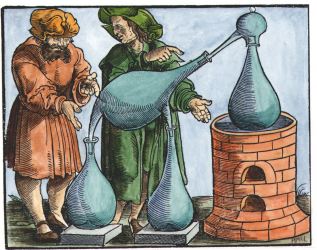Here is a review in English of Susanna Akerman's book on
Queen Christina as Alchemist, which is in Swedish
http://www.swedishbookreview.com/show-review.php?i=485
====================
Susanna Åkerman, Fenixelden. Drottning Kristina som alchemist (The Phoenix Fire: Queen Kristina as Alchemist)
Gidlunds, 2013.
Reviewed by Mia Österlund in SBR 2014:2
Review Section: Non-Fiction
Includes 12 pages of illustrations
Queen Kristina, who abdicated from the Swedish throne in 1654, converted to Roman Catholicism the following year and spent the rest of her life in Rome where she died in 1689. Unsurprisingly, she has been the subject of much interest and quite a few studies. Her life raises numerous questions, most importantly about her reasons for abdicating and for converting to the faith whose influence her father, Gustav II Adolf, had fought to circumscribe. Susanna Åkerman’s book opens up new perspectives on the queen who had admired Alexander the Great since she was a child, who refused to marry, and who sought the company of learned men. By exploring Kristina’s extensive interests in hermetism and alchemy, Åkerman is able to unveil a new context for her key decisions and unconventional way of life, opening up perspectives on an interpretation of the world that is far removed from the rationalism and scientific logic of the modern era but provided a highly influential model for many centuries. Elements of it still appear today, the best-known example being J K Rowling’s series of books about Harry Potter.
Originating in the works ascribed to Hermes Trismegistos, which emerged in the Greco-Egyptian culture in the first few centuries CE, hermetism was based on the understanding that the cosmos constituted a unity in which all parts were interdependent. To find out more about how these parts were related, the individual human being could explore the arcana of alchemy. The progressive experiments in the laboratory were paralleled by the inner development of the alchemist, the ultimate aim of the process being her/his deification – personal rebirth through knowledge. The perfected human being, interestingly, would be androgynous.
It would seem that Kristina came into contact with alchemy before she left Stockholm. Johannes Bureus, Custodian of National Monuments, had been her father’s teacher and influenced her too, especially with regard to hermetic literature and cabbala. Her invitation to Descartes, then, was not prompted by her interest in his philosophy: instead, Åkerman argues,their encounter became a confrontation between Kristina’s hermeneutic worldview and Descartes’ rational one. In Palazzo Riario, her residence in Rome, Kristina had both an exceptionally well-equipped library and a laboratory. Åkerman suggests that the former Swedish queen regarded herself as an adept in the alchemist sense, working towards her rebirth through knowledge.
The evidence chiefly comes from the detailed study of the material in Kristina’s library, some of it still available in other libraries, some of it scattered soon after her death and now only listed in catalogues. Åkerman has also gathered information about Kristina’s regular meetings with learned men, her establishment and membership of esoteric orders, and the comments of those who met and got to know her. It adds up to a huge amount of material in several languages. The appendix detailing Kristina’s manuscripts (now in the Vatican Library) along with a selection of the published titles on alchemy, chemistry and medicine in her library runs to 20 pages, the texts listed written mostly in Latin but also in Italian and French. Åkerman has previously published extensively on Kristina and rosicrucianism (the combination of Judeo-Christian religion with Greco- Egyptian hermetism) in English, including two books, and she guides the reader most competently through what is at once alien and fascinating territory. Regrettably, the book lacks an index of personal names. It would also have benefited from more rigorous editing and proofreading.
Rejecting the arguments that Kristina abdicated either because she wanted to become a Roman Catholic or because she needed Roman Catholicism to underpin her refusal to marry, Åkerman believes the true reason was her desire to escape from the stifling narrowness of life at the Swedish court – and to develop her knowledge in the context of the intellectual networks she could build abroad. In light of Åkerman’s impressive volume, this is a most persuasive argument.
Last edited on Mon Nov 3rd, 2014 10:26 am by adammclean
|

